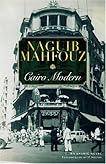 A number of years ago I happened upon The Cairo Trilogy and fell in love with Naguib Mahfouz and the Egyptian world he created. The series made me want to pick up and move to Cairo - well, the historical Egypt created by Mahfouz at any rate. Mahfouz had an incredible way of introducing readers to the subtleties and intricacies of social and political life in Egypt.
A number of years ago I happened upon The Cairo Trilogy and fell in love with Naguib Mahfouz and the Egyptian world he created. The series made me want to pick up and move to Cairo - well, the historical Egypt created by Mahfouz at any rate. Mahfouz had an incredible way of introducing readers to the subtleties and intricacies of social and political life in Egypt.When my mom handed me Cairo Modern I was thrilled to revisit the world of Mahfouz.
A couple of initial thoughts:
Why is this "an Arabic novel"? The subtitle is extremely odd. Is any book about Egypt Arabic? Or is Arabic synonymous for Muslim? Is it only the American edition that adds that subtitle? Why?
What happened to bring this book to the American audience in 2008? Given all of Mahfouz's works, was there something in particular about Cairo Modern that interested American publishers now?
Cairo Modern is not nearly as accessible a story as Mahfouz's Cairo Trilogy. The main character in this story is not sympathetic and hard to engage with. While writing a story about his plight as a university student hampered by poverty is laudable, Mahfouz sets up a protagonist who is unlikable. In addition, for an American audience, the plot is very limited. The story revolves around a very small set of choices and outcomes.
Hmm.. that's not really true, I suppose. But it seems like the story circles on itself and spends significant time reflecting on minute details.
Despite my criticisms and questions, I think Mahfouz's book has a valid role as an academic source. Mahfouz has written a pointed caricature of Egyptian society in the early 1930s. From the story it is clear that Mahfouz finds the social changes occurring in the era to be corrupting and problematic for the Egyptian people - in particular the college educated who are expected to thrive in this bifurcated, confused society.
I think a study of women in Cairo Modern, as in Mahfouz's other novels I have read, would be a worthwhile venture. The new choices for women in the "modern" unveiled world, as described by Mahfouz are in no way laudable. I would argue that Mahfouz would have preferred the "anti-modern" or maybe "a-modern" world of the pre-World War I era.
I am glad I read Cairo Modern. But, I'm glad I read it as a scholar who teaches Middle Eastern History. There are very few people I would recommend this book to (not because it is a bad book AT ALL but because it has an extremely narrow scope), and most of them would be scholars, not fiction lovers.
If you liked Cairo Modern I would recommend:
- Women and Gender in Islam by Leila Ahmed
- The Dessert Queen by Janet Wallach
No comments:
Post a Comment